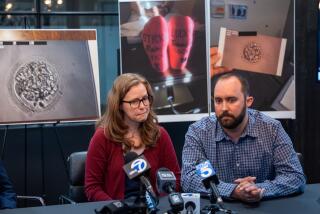Superbug outbreaks: Seattle hospital accuses Olympus of hiding scope defects
- Share via
A Seattle hospital hit by a superbug outbreak is teaming up with a patient’s family and accusing Olympus Corp. of selling a defective medical scope prone to spreading deadly bacteria.
Virginia Mason Medical Center said it had meticulously followed Olympus’ instructions for cleaning the duodenoscopes, but it still had a superbug outbreak that infected 39 patients from 2012 to 2014.
The hospital filed its fraud claim against Olympus on Monday in King County Superior Court in Washington.
A similar outbreak in 2012 in the Netherlands prompted Olympus to issue a safety alert to European hospitals in January 2013. The Japanese device maker sent a second warning in Europe in August 2014 after receiving complaints of debris on scopes even after they were disinfected.
But Olympus didn’t send an alert in the U.S. until after The Times reported on seven scope-related infections at UCLA on Feb. 18, 2015.
Olympus’ “silence on this important issue was unethical, irresponsible and dangerous. Through this deception, Olympus showed a reckless disregard for patient safety,” said Dr. Andrew Ross, section chief for gastroenterology at Virginia Mason.
“Olympus misled countless physicians nationwide by intentionally withholding critical information about its product,” Ross added.
A spokesman for Olympus said the company expresses sympathy to patients who have experienced infections and to their families.
“We are continuing our investigation into the reports at Virginia Mason to be able to provide a more thorough and balanced perspective on the issues including potential causes of the infections,” the company spokesman said.
The Seattle Times first reported the hospital’s legal claim.
Virginia Mason’s allegations against Olympus came in response to a suit filed in March by the widow of a Virginia Mason patient who died in August 2013.
Theresa Bigler, 59, had sued both Virginia Mason and Olympus in connection with the death of her husband, Richard, in 2013. She said he was infected by a contaminated scope and died soon after.
John Gagliardi, an attorney representing the Bigler family, said he welcomed the hospital’s help in holding Olympus accountable for its conduct.
“It’s not very common to get a healthcare provider to join with a patient who sued them,” he said. “It’s a big deal because they obviously have a lot more knowledge about the product and how it should be used and cleaned.”
Gagliardi said Virginia Mason would remain a defendant in his client’s case, but he said he didn’t anticipate presenting any evidence against the hospital.
“Based on the information we have now, it doesn’t appear Virginia Mason was a bad actor,” he said.
The Food and Drug Administration is convening an advisory panel Thursday and Friday to examine numerous issues related to the use and cleaning of these medical instruments.
The duodenoscopes are long, flexible devices that are put down a patient’s throat during a procedure known as ERCP, or endoscopic retrograde cholangiopancreatography.
Olympus holds an estimated 85% share of the U.S. market for these devices and other specialty endoscopes. Pentax and Fujifilm are two other manufacturers.
Twitter: @chadterhune
More to Read
Inside the business of entertainment
The Wide Shot brings you news, analysis and insights on everything from streaming wars to production — and what it all means for the future.
You may occasionally receive promotional content from the Los Angeles Times.











